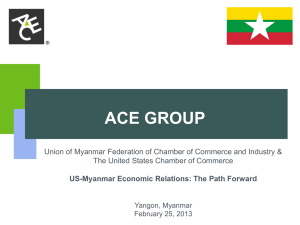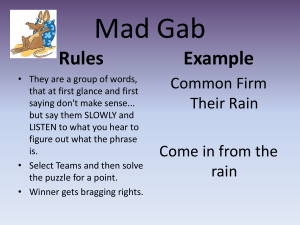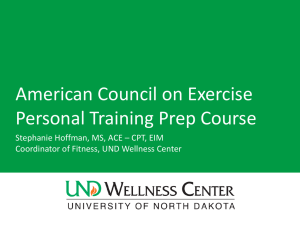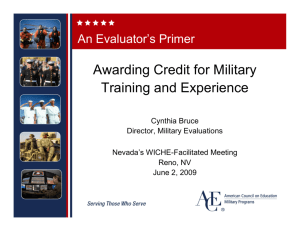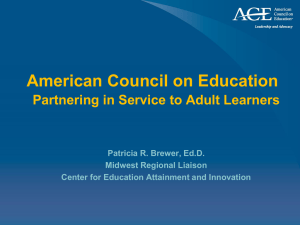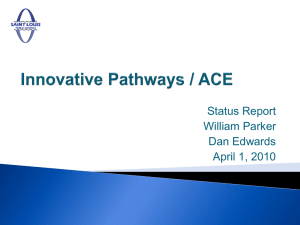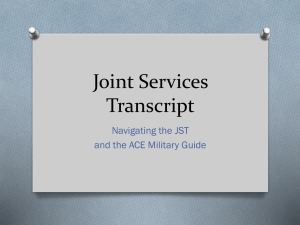Dr. Kathryn M. Snead - Servicemembers Opportunity
advertisement
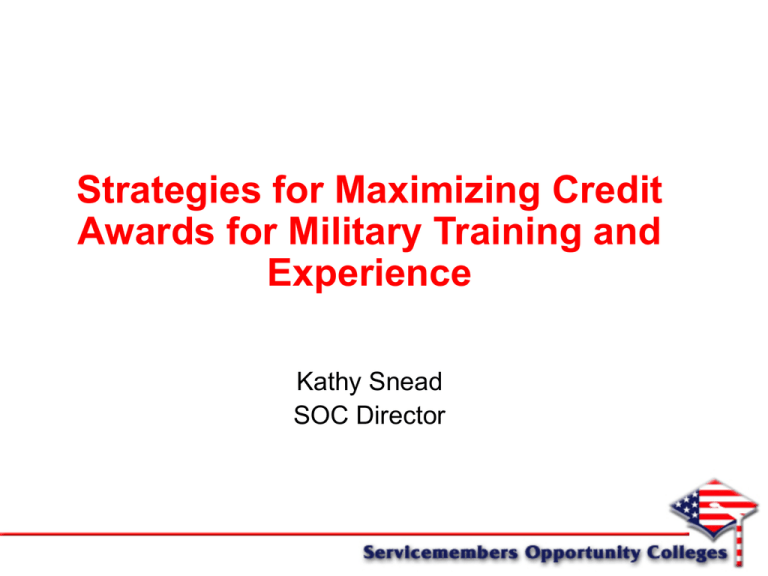
Strategies for Maximizing Credit Awards for Military Training and Experience Kathy Snead SOC Director Why credit awards for miIitary training are important to servicemembers a) Recognizes college-level knowledge/skills gained from military experience b) Institutional value statement about military service to country (affirmation that veterans matters to school) c) Jump starts a veteran’s academic progress; reduces amount of coursework required for the degree d) Motivates a servicemember toward degree completion by communicating prior learning accepted e) Accelerates their entry into the work world by shortening their degree completion time f) All of the above Why faculty/college administrators are hesitant about awarding credit for miIitary training and experience: a) Concerned it will lessen academic quality of the degree b) Concerned it will impact accreditation c) Don’t fully understand the ACE Military Programs evaluation process d) Concerned that awarding “applied” credit for “theoretical” knowledge may disadvantage the military student e) Aren’t fully knowledgeable about military culture and level/extent of military training f) Financial “incentive” not to award credit, student has to take more courses, college receives more tuition/fees g) All of the above In a ‘perfect’ world... all college registrars, transcript evaluators, academic deans and department heads would have served at least one tour in the military or participated as a evaluator on an ACE Military Programs evaluation team. Lacking a ‘perfect’ world...what can we do to eliminate or minimize these concerns? • Provide campus training and informational experiences to share military culture (guided discussions in faculty senate committees) • Coordinate “educator tours” of military installations, training exercises • Invite military personnel (and campus veterans) as guest lecturers—issues/topics demonstrating skill/knowledge acquired in military • Host campus (regional or state-wide) workshops to help understand the formal training that the military provides AND ACE military evaluation process (use off-campus experts) Such professional development opportunities might include: • Background and information about the military student population and potential transfer credit opportunities. • Background and information on Servicemembers Opportunity Colleges’ mission/functions as liaison/conduit. • A clear understanding of the American Council on Education’s (ACE) Military Programs credit evaluation process. • An overview about use and benefits of the transcript services (AARTS, SMART, CGI, and ACE transcripts). • Practical hands-on exercises to explore college options for applying evaluated credit toward degree requirements. Servicemembers Opportunity Colleges (SOC) Mission • Serve as vehicle to help coordinate postsecondary educational opportunities for servicemembers • Strengthen liaison and working relationships among military and higher education representatives • Advocate for flexibility needed to improve access to and availability of educational programs for servicemembers Servicemembers Opportunity Colleges (SOC) Principles • Servicemembers should share the same educational opportunities available to their civilian counterparts • Educational programs that are provided by appropriately accredited colleges and universities • Educational programs that are flexible in terms of scheduling, academic residency, course transfer, and acceptance of non-traditional credit SOC Criteria for Membership • Reasonable with Transfer of Credit from other institutions - Minimum loss of previously earned credits - Avoid coursework duplication • Reduced Academic Residency Requirements - 25% maximum for most programs - 30% for schools providing undergraduate degrees 100% online - No final year or final semester mandatory requirement • Credit for Military Training and Experience - Award credit for military service schools - Recognize and use ACE Guide in evaluating military training experiences • Credit for Nationally-Recognized Testing Programs - Award credit for at least one nationally-recognized testing program such as CLEP, DSST , ECE ACE Center for Lifelong Learning Program Evaluations • Military Programs • Corporate Programs Third-party review gives unbiased assessment of nontraditional learning, training courses Engages subject matter experts in evaluative credit process where institutions may not have expertise Military Course Evaluations • Formal military instruction and military occupations specialties courses approved by a central authority • Correspondence courses with proctored end-of course exams • Distance learning/online courses with documented rigid control test conditions and firm identification of the student Program Evaluation Activities Evaluate formal courses and occupational specialties Publish course and occupation descriptions and academic credit recommendations Transcript and registry services About Military Evaluations 2008 Fiscal Year • 35 installation visits • 1,200 courses • 25 occupations • 150 teaching faculty members • 3,400 semester hours in the lower division • 900 semester hours in the upper division • 300 semester hours in the graduate division Evaluator Representation • Accrediting agencies Practitioner or Other 3% Community College 19% • Types of institutions Univ ersity 51% 4-Year College 27% • Approximately 7,000 faculty on military teams (since 1954) Evaluative Criteria for Courses • Course content • Learning outcomes • Depth and breadth of material • Level of difficulty • Applicability to postsecondary programs • Evaluative instruments • Outside assignments • Instructor qualifications Defining College Level Work Content, scope, and rigor must be at the postsecondary level. • Vocational / Certificate • Lower Division • Upper Division • Graduate No Credit Recommended • Material presented in the course is not comparable to content and rigor at the postsecondary level • Material offered is inadequate for a judgment to be made • Inadequate outcome assessments Military Occupation Evaluation • Occupation is a job designation by the military service • Review and assessment are more experiential in nature • Teams validate demonstrated and expected job knowledge, skills, abilities by pay grade Military Occupation Evaluations: Official Documentation • Occupation manuals • Technical guides and training manuals • Promotion examinations • Study guides • Other official branch specific documentation ACE “Military Guide” Online www.militaryguides.acenet.edu •Daily updates •1954 to1989 •The last printed Guide The ACE Guide on CD 2009 Guide On CD (late November 2009 release) Military Guide Online • Over… • 15,000 course exhibits • 3,100 www.militaryguides.acenet.edu occupation exhibits Sample Exhibits Military Transcripts: AARTS and SMART Features of Web Delivery https://aartscolleges.army.mil https://smart.navy.mil Military Transcripts: CGI and CCAF Serve as an Evaluator • You must be actively teaching college-level courses. • When your discipline expertise is needed, you are contacted directly to serve on the ACE team. •Evaluator training provided; also provide evaluator handbook • ACE pays all evaluators an honorarium and travel. www.acenet.edu/evaluators evaluators@ace.nche.edu Applying Evaluated Credit Mapping non-traditional credit toward degree requirements is much like applying transfer credits: • There is no “magic” formula • Varies by individual student (as appropriate to his/her degree requirements) • Requires knowledge of what was learned (depth and breadth of content, learning modalities, outcomes) • Often involves faculty/departmental involvement in those credit decisions (setting the stage for success with sufficient ACE Guide information) • Goal of the decision process is to find the “best fit” Transfer Decision Resources • Full Course exhibits from the ACE Guide (instruction, outcomes, length of course) • “Related Competency” descriptions in the ACE Guide military occupation exhibits • SOC DNS Credit Evaluation Supplement • Alternative methods for demonstrating acquired knowledge and skills: — Portfolio Review (EERs, OERs, certificates) — Challenge examinations — Nationally recognized testing programs (CLEP, DANTES SST, or Excelsior College Exams) • Combining credits from other military experiences Ensuring Consistent Credit Awards • Establishing standard procedures (institutional and departmental level) • Creating institutional tracking mechanisms • Automating credit award “look up” function • Building your database incrementally (as evaluations needed) • Collaboration, rely on “experts” to guide policy and procedural development • Where state-wide articulations exist, leverage work of other institutions with established military evaluation processes ACE Resource Tools for Colleges and Universities www.acenet.edu/militaryprograms/resourcetools • Centralized repository for colleges and universities • Sample transcripts • Rank charts • Quick links to other resources Resources: ACE Military Brochures Resources: A Transfer Guide •Written specifically for the service member •Released March 2009 •Provides simple, straightforward guidance on understanding military credit recommendations and transcripts •Includes definitions of common terms, answers to frequently asked questions, and a transfer credit checklist • On ACE Web site SOC Resource Tools for Colleges and Universities SOC DNS Credit Evaluation Supplement Purpose: academic placement guidelines for optimizing the application of non-traditional credit toward degree requirements • Credit mapping of ACE credit recommendations for military training and occupational specialty experience • CLEP/DSST/ Excelsior Exams • CCAF courses • DANTES Independent Study Courses American Council on Education One Dupont Circle, NW, Suite 250 Washington, DC 20036 Toll Free: 866-205-6267 Military Programs 202-939-9470 or mileval@ace.nche.edu www.acenet.edu/militaryprograms Servicemembers Opportunity Colleges 1307 New York Avenue, NW Fifth Floor Washington, DC 20005-4701 Phone: 800-368-5622; 202-667-0079 Fax: 202-667-0622 E-mail: socmail@aascu.org
